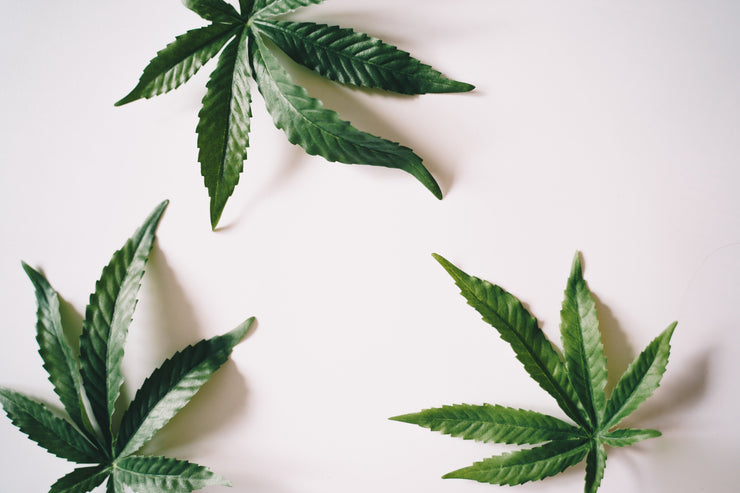CBDA vs CBD: What's The Difference?


In this article, we’ll explore the key differences between CBDA and CBD, how each one affects the body, and what current research says about their potential uses.
Table of Contents:[hide]
What is the difference between CBDA and CBD?
CBDA (cannabidiolic acid) is the raw, acidic precursor to CBD (cannabidiol). It naturally occurs in the hemp plant and converts into CBD through a process called decarboxylation, which involves heat, light, or oxygen exposure. This means fresh hemp contains mostly CBDA, while CBD dominates after processing or heating.
The two cannabinoids differ chemically and interact with your body differently. Unlike CBD, CBDA does not directly bind to the body's main endocannabinoid receptors (CB1 and CB2). Instead, it inhibits enzymes like cyclooxygenase-2 (COX-2), which relates to pain and inflammation relief. CBDA also influences serotonin receptors, potentially easing nausea and anxiety. CBD indirectly interacts with the endocannabinoid system and affects various receptors to promote well-being, mood, pain relief, and sleep support. [2]
CBDA tends to be more potent but less stable than CBD, with a shorter shelf life due to its chemical volatility. Both compounds can work synergistically, producing an entourage effect where the combined impact enhances benefits.

How do CBDA and CBD affect your body?
CBDA’s unique mechanism is based on inhibiting the COX-2 enzyme linked with inflammation and pain, giving it notable anti-inflammatory potential. It also activates serotonin receptors to combat nausea and anxiety, which may make it more effective than CBD in these specific areas. [1]
CBD interacts more broadly with the body's endocannabinoid system, regulating processes such as mood, pain perception, sleep, and appetite. It has low binding affinity to cannabinoid receptors but acts through multiple pathways, including modulating serotonin receptors and reducing inflammation.
You might find CBDA acts faster due to potentially higher bioavailability, while CBD's effects may last longer. However, individual responses vary, and these cannabinoids can complement each other when used together.
What are the benefits and uses of CBDA and CBD?
CBDA shows promise particularly for nausea, vomiting, anxiety, inflammation, pain, and even mood disorders. Research suggests it might be more potent than CBD in reducing nausea, including chemotherapy-induced vomiting, which is a major quality-of-life concern for cancer patients. CBDA also maintains anti-inflammatory effects by targeting COX-2 enzymes and may benefit cardiovascular health and neurological conditions like Alzheimer’s disease in preliminary studies. [1]
CBD is widely used for managing anxiety, chronic pain, sleep difficulties, and stress. Its calming effects are well-recognised, and it supports overall wellness without causing intoxication.
Both compounds show analgesic and anti-inflammatory properties, but CBDA's instability requires careful handling during product manufacturing.
Are CBDA and CBD safe to use?
Both CBDA and CBD are generally well-tolerated with a low risk of serious side effects. Some users may experience mild effects such as dry mouth, drowsiness, or changes in appetite. It’s important to start with low doses and monitor your body's response.
CBDA is more sensitive to heat and environmental factors, so products containing it should be carefully formulated and stored to preserve potency.
Importantly, neither CBDA nor CBD produce psychoactive effects or a “high.” This makes them suitable for those seeking relief from symptoms without intoxication. [1]
How to choose between CBDA and CBD products?
Most CBD products on the market are derived from decarboxylated hemp oil, making them rich in CBD but low in CBDA. Full-spectrum CBD oils may contain some residual CBDA, alongside other cannabinoids and terpenes, which work together to enhance benefits through the entourage effect.
If you're interested in the benefits of CBDA, look for raw hemp extracts, CBDA-specific tinctures, or oils that preserve the acidic cannabinoid by avoiding heat during production. These products can be rare and often come at a premium.
CBD offers a wider range of accessible products due to its stability and broader availability, which might suit those seeking more conventional supplementation.
How does CBDA convert to CBD?
CBDA converts to CBD through decarboxylation: a chemical process triggered mainly by heat. When hemp is exposed to heat through smoking, vaping, cooking, or extraction, the CBDA loses a carboxyl group and becomes CBD.
This process means that fresh, raw hemp contains CBDA, while most commercial CBD products predominantly contain CBD. Because CBDA is much less stable, it requires careful handling to avoid conversion before consumption.
What does research say about CBDA vs CBD?
Scientific studies indicate that CBDA may be more potent than CBD for reducing nausea and vomiting, supporting its use in conditions like chemotherapy-induced nausea. For example, animal studies demonstrated CBDA’s effectiveness at extraordinarily low doses for nausea, likely acting through serotonin receptor modulation. [2]
CBD shows efficacy in reducing nausea, anxiety, and pain, with a broader research base supporting its safety and therapeutic roles. CBD has also been studied for its indirect influences on the cannabinoid receptors and serotonin system.
Both cannabinoids show promise for anti-inflammatory and anti-anxiety effects, but clinical human studies on CBDA are still emerging. Meanwhile, CBD has regulatory approvals for certain treatments and more established use in wellness products.
Can CBDA and CBD work together?
Yes, CBDA and CBD can create an entourage effect. This means their different mechanisms and interactions with the body combine to enhance overall benefits beyond what each could achieve alone.
Full-spectrum CBD oils often contain minor amounts of CBDA, along with terpenes and other cannabinoids, offering a balanced and synergistic experience.
Try Orange County’s lab-tested CBD products
If you’re interested in high-quality CBD oil products, Orange County CBD offers a range of full-spectrum oils and CBD gummies, crafted with USA-sourced organic hemp and independently tested in the UK. Our products are 100% vegan, free from GMOs, and compliant with UK law.
For those curious about exploring the benefits of both CBD and CBDA, starting with our full-spectrum CBD oils is a great way to tap into the entourage effect naturally. Our commitment to transparency means you receive traceable, lab-verified products to support your wellness journey with confidence.
Research
[1] Cannabidiolic acid, a still overlooked bioactive compound: An introductory review and preliminary research.
https://www.ncbi.nlm.nih.gov/pmc/articles/PMC7321064/
[2] Therapeutic potential of cannabidiol, cannabidiolic acid, and cannabidiolic acid methyl ester as treatments for nausea and vomiting. Cannabis and Cannabinoid Research, 6(4), 266–274.
https://pmc.ncbi.nlm.nih.gov/articles/PMC8380783/

